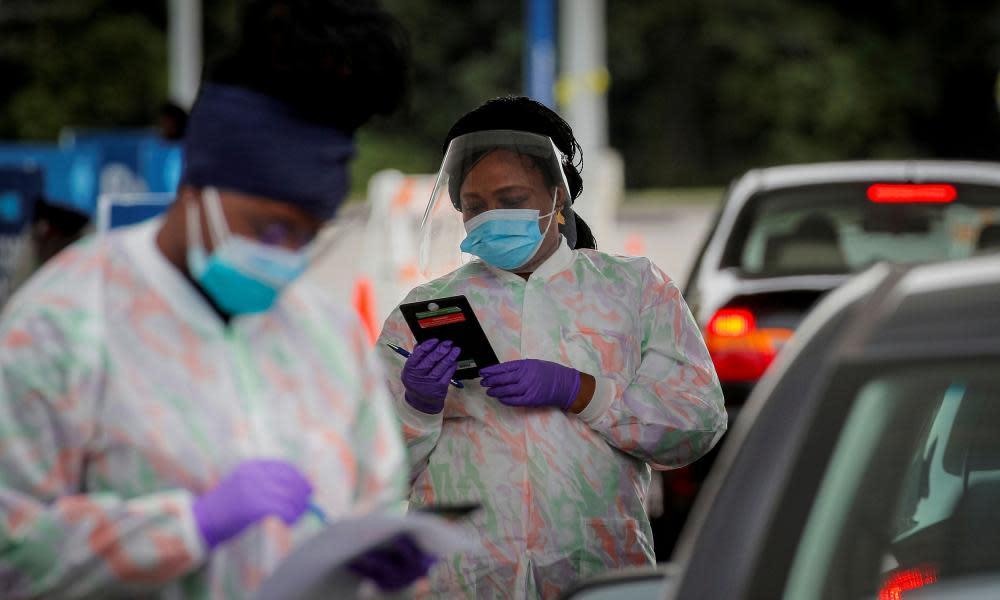US passes 7m Covid cases as health officials warn second surge could come

As the United States passed 7m Covid-19 cases on Friday, top public health officials are doubling down on warnings about a difficult winter while affirming their trust in scientists as vaccine development becomes political.
As of Friday afternoon, the US has 7,005,746 known cases of Covid-19, according to Johns Hopkins University’s count.
Cases have continued to rise by the tens of thousands every day, with the number of daily new cases rising in 23 states this week while decreasing in 11 others. Earlier this week, the US reached 200,000 deaths blamed on coronavirus.
There are more than 32 million known cases globally, and almost 985,000 deaths.
Related: Coronavirus continuing to mutate, study finds, as US cases rise
The Centers for Disease Control and Prevention (CDC) released a report this week that shows Americans in their 20s have been the main drivers of the virus, representing about 20% of positive cases, over the summer.
Health officials warn that a surge in cases could come as the country heads into fall and winter.
Dr Anthony Fauci, the nation’s top infectious disease expert, said that the US is technically still in its first wave of cases since the number of cases never dropped down to a baseline that would constitute the end of a wave, and the pandemic is not under control.
Fauci has been busy trying to dispel concerns that the White House’s refusal to be realistic about the timeline of a vaccine release means that a vaccine, if made available soon, will be rushed and potentially not safe.
Public health experts, including Fauci, say that we will likely know whether any of the vaccines that are currently in the final stages of clinical trials are safe and effective by November or December. It is unlikely to happen before election day on 3 November and will not be available widely until at least 2021.
Earlier this week, Donald Trump said that it would be a “political move” if the Food and Drug Administration (FDA) were to release tougher standards for a vaccine, saying that the White House “may or may not approve” of release such standards.
“I would back the scientists. I would have to do that, as a scientist, and I would express that,” Fauci said in response. “I rely heavily on the decades of experience of the FDA scientists who say we should do this. Therefore, I would have to lean heavily no their side and support them.”
Stephen Hahn, the commissioner of the FDA, made similar promises to stick with science in a hearing in front of Congress this week. “I fight for science. I will fight for the integrity of the agency, and I will put the interests of the American people before anything else,” he told lawmakers on Wednesday.
While top health officials are making promises to stick to scientists, the White House has largely been on the defensive. “You shouldn’t be punished for doing something faster than people have done or thought,” said Trump’s new coronavirus adviser, the controversial Scott Atlas, at a press briefing Wednesday.
When asked later if he could confirm that there is no clear-cut timeframe for when the vaccine will be released, Atlas said he is merely repeating what he’s hearing from people in charge of vaccine development.
“It is highly likely we will have a vaccine before the end of the year,” he said, though he said a few moments later that “no one can really say with certainty when it’s coming. That’s just impossible.”
Deborah Birx, once a mainstay of the White House’s coronavirus press briefings as part of the task force, but rarely heard from in public lately, has reportedly started to question her role on the White House’s coronavirus task force.
Sources told CNN that Birx views Atlas as an unhealthy influence on Trump. “The president has found somebody who matches what he wants to believe him,” a source said of Birx’s view of Atlas. “There is no doubt that she feels that her role has been diminished.”
When asked to comment on the report during a press conference in Alabama yesterday, Birx did not outright dispute it. Instead, she joked, “Do I look like a person that’s diminished? I’ll tell you that is the first time those adjectives have been used in describing my behavior.”


